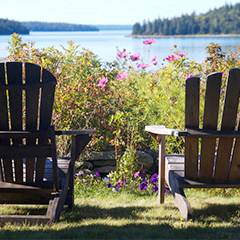Do You Own a Vacation Rental Home with Limited Personal Use?
September 2, 2016 | Deductions, Financial Planning, IRS Regulation, Tax Planning, Tax Preparation
 Vacation properties in Maine are subject to different federal income tax rules depending on how much personal and rental use they have during the year. Now is a good time to plan how to use your Maine vacation property for the rest of this year with tax savings in mind.
Vacation properties in Maine are subject to different federal income tax rules depending on how much personal and rental use they have during the year. Now is a good time to plan how to use your Maine vacation property for the rest of this year with tax savings in mind.
Tax Rules for Maine Vacation Home Rentals
If you rent out your vacation home for more than 14 days and your personal use does not exceed the greater of 14 days or 10% of the rental days, then it will be treated as a rental property for federal tax purposes.
For example, if you rent your property for 210 days and vacation there for 21 days, your property will be treated as a rental. But if you vacation there for 22 days, the property is considered a personal residence.
Follow this six-step procedure to report the income and expenses for federal income tax purposes if your property qualifies as a rental.
1. Report 100% of the rental income on your tax return.
2. Deduct 100% of any direct rental expenses, such as rental agency fees and advertising.
3. Allocate mortgage interest, property taxes and indirect property expenses between rental and personal use based on actual days of rental and personal use. Indirect expenses include such items as maintenance, utilities, association fees, insurance and depreciation.
Continuing with the previous example, you would allocate 210/231 of the mortgage interest, property taxes and indirect expenses to rental use. Then you would allocate 21/231 of these expenses to personal use.
4. Deduct as rental expenses the allocable expenses from Step 3.
5. Stop here if you show a profit. Sorry, you owe taxes. But if you show a loss, you’ll need to figure out whether the potential write-off is limited by the passive activity loss (PAL) rules.
In general, you can only deduct passive activity losses to the extent you have passive income from other sources, such as rental properties that produce positive taxable income. Fortunately, an exception allows you to write off up to $25,000 of passive rental real estate losses even if you have no passive income.
You must actively participate in renting the property and have adjusted gross income (AGI) under $100,000 in order to qualify. The exception is phased out between AGI of $100,000 and $150,000. Also, the IRS says the exception is unavailable if the average rental period for your property is seven days or less, which is often the case in resort areas. So, many owners of rental properties find their tax losses postponed by the PAL rules.
You’re allowed to carry forward any unused passive losses to future tax years when they can be deducted if you, 1) report enough passive income from other sources, or 2) sell the property.
6. Deal with mortgage interest, property taxes and indirect operating expenses allocable to periods of personal use. Unfortunately, you can’t deduct the personal-use portion of mortgage interest from a rental property, because it doesn’t qualify as a personal residence for mortgage interest deduction purposes.
In the previous example, the ratio of personal use to total use was 21/231. So, you’d lose out on 21/231 of your mortgage interest and indirect expense deductions. But you can deduct 21/231 of the property taxes as an itemized deduction on Schedule A of your return, but it’s subject to the phase-out rule for high-income earners that normally applies to these deductions.
Guidelines on Personal Use
For federal income tax purposes, personal use of a vacation property includes use by:
- You,
- Other family members, whether or not they pay fair market rent, and
- Anyone else who pays less than market rent.
For the purpose of these rules, family members include your spouse, siblings, half-siblings, ancestors (such as parents and grandparents) and lineal descendants (such as children and grandchildren).
Personal use also includes time spent at your property by another party under a reciprocal sharing arrangement, whether or not the other party pays market rent. Under such an arrangement, the parties agree to “swap” properties.
Mid-Year Tax Strategies
You may benefit from taking some extra vacation days during the rest of the year, from a federal tax perspective, as that could move your home from being classified as a rental property for tax purposes to being classified as a personal residence. With a personal residence, you can usually deduct all the mortgage interest and property taxes (part as rental expenses and part as itemized deductions). And you can usually shelter any remaining rental income with allocable indirect operating expenses (such as maintenance, utilities, and depreciation).
On the other hand, you may have plenty of passive income or AGI below $100,000 and no problem with the seven-day rule. In these scenarios, you can currently deduct your whole rental loss. Consider minimizing your personal use for the rest of the year in order to increase your fully deductible rental loss if the nondeductible mortgage interest allocable to personal use would be a relatively small amount. You might also be able to rent the place out for more days, which would boost your cash flow.
The rules explained here apply only to vacation home rentals that have limited use by you (or your family and friends). For properties that are classified as personal residences, different tax rules apply. Contact Filler and Associates or your tax professional for more information on vacation home rentals in Maine.
